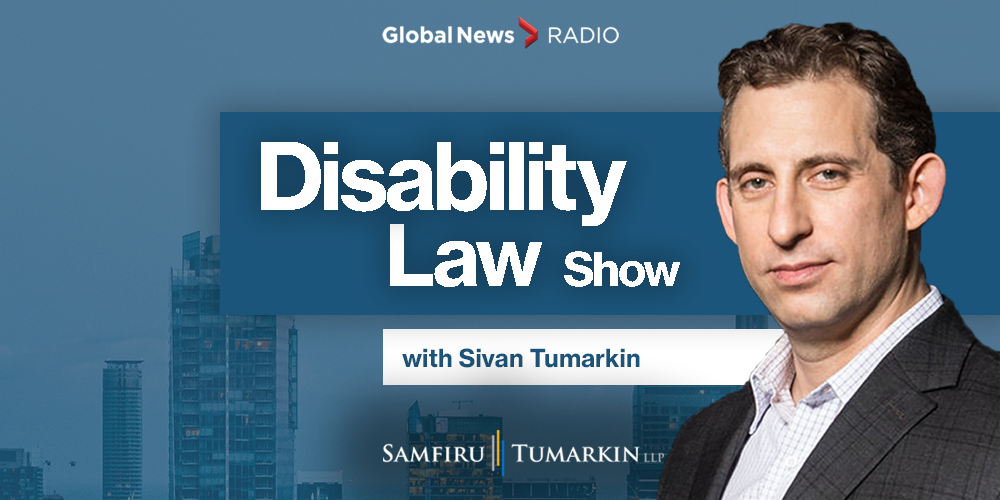Disability Law Show Global News Radio – S8 E14

Episode Summary
Discover your rights and the TRUTH about long-term disability and personal injury on S8 E14 of the Disability Law Show on Global News Radio in Toronto and Vancouver.
Listen below to Sivan Tumarkin co-founding Partner and Partner Albert Klein, disability lawyers at Samfiru Tumarkin LLP as they join co-host John Scholes and guide you through the proper steps to take when your insurance provider cuts off your long-term disability or denies your insurance claim.
Listen to the Episode
Episode Notes
When I go to an independent medical assessment (IME) can I take an advocate with me? Can I refuse to go if I’m not allowed an advocate or chaperone?
There is no hard and fast rule here, typically insurance companies don’t like it. Some doctors who work for insurance companies may refuse to do an assessment if there is someone else in the room. I haven’t seen anywhere in an LTD policy where you have to attend by yourself, but in some instances I’ve had the insurance company say yes, and in some instances they’ve said no. At which point it becomes a point of contention and a negotiation. If an individual has this concern, you should reach out to us.
Can my independent medical assessment be done virtually?
I see no reason why most independent medical assessments can’t be done remotely. If an insurance company is telling you that you need to travel long distances to undergo one of these assessments, and you have difficulty with that, I don’t see any reason why you can’t ask for alternatives. I think COVID-19 has changed the landscape for how these assessments are done. You still must undergo these assessments, because it’s an obligation under your policy, but I think that people should now have more options.
When someone is approved for long-term disability, is this reviewed on a yearly basis?
I think it depends on the severity of the disability. For example, somebody who has a very severe condition, illness or injury, clearly for the insurance company to request an update as to whether you’re disabled or not every week is ludicrous. But if you are suffering from a mental health illness or if you’re suffering from, let’s say fibromyalgia, I can see the insurance company asking you for some kind of an update every few months, maybe three months, six months, at least once a year.
There’s no one size fits all model because every condition is different. Every condition can be permanent and it’s very obvious that nothing’s going to change, but most conditions are quite fluid. It’s tough to generalize how often they’re actually allowed to check in. What I usually say to my client is, if it’s not really going to bother you to provide them with this information, or there’s no medical reason not to, you probably want to do it. You’re probably better off doing that because you don’t want to equip the insurance company with any arguments or any reasons that they should be able to cut you off. If you’re ever wondering whether or not you should be submitting medical information, just give us a call anytime and we’ll discuss whether or not it’s reasonable what they’re out of you.
Can you lose your job while you are on long-term disability?
It depends. Can you lose your job? Yes, you can. Should you lose your job? No, you should not. Disability is a protected ground under most human rights legislation in Canada. In the jurisdictions that we operate in, Ontario, British Columbia, and Alberta, if you fire someone because they’re disabled or while they’re on disability, you as an employer, are potentially opening yourself up to a human rights complaint and to human rights damages that you may have to pay out, not to mention potential severance and termination pay that you’re going to have to pay out.
In some instances, if you’re on disability for many years, the employer can take the position that the contract of employment has been frustrated and they may let you go. They may have to pay you something for that, and in some cases they may not. And what we tell people is contact us because here you are dealing with those two issues which are intersecting: long-term disability law and employment law. And those two can affect each other. One of the unique things about our firm is that really we do have those two practice areas. We do employment law and long-term disability. Our lawyers have expertise in both areas. If you’ve lost your job or you have a situation at work that now leads to potential severance discussions with your employer, or even if your employer has let you go and said, “we’re going to pay you X amount of severance or termination pay”. You’re thinking to yourself, do I have to tell my LTD Insurer about that? If you lose your job while you’re on LTD, it’s important to inform your lawyer, because your insurer may be entitled to a credit or an offset for any severance you receive from your employer. You want to make sure that whatever you do, you go to a lawyer or a law firm that has expertise in both areas of law.
If my disability is prolonged, would I be getting LTD benefits be until age 65? And would I still have entitlements to work benefits (prescriptions, dental, etc.)?
There is no automatic right to get LTD until age 65. That’s not to say that you should not get it get it until age 65. I mean listen if you’re disabled, if you’ve suffered a severe injury or you have a severe illness and you’re 64 years old, chances are you’re going to be not working until age 65. But if you’re 25 years old, and you’re suffering from some mental health issues perhaps etc., it’s questionable whether or not you’re going to have those issues for the next 40 years. So, the insurance company is going to be assessing you on an ongoing basis.
The second issue here is entitlement to work benefits and prescriptions dental if you are on disability. In many instances the employer does not have an obligation to continue your health benefits. Again, it’s on a case-by-case basis. But typically, in most situations the employer will in many instances actually pay out these work benefits, they will cover you but only for a set period of time. They don’t have an obligation to continue this forever.
I’ve been LTD for over two years. My insurance company asked me to apply for CPP, and I was approved in March of this year, and I received a cheque. Am I responsible to let the insurance company know about my CPP disability benefits money I have received?
Generally speaking, insurance companies aren’t going to do things gratuitously. Meaning, they’re not going to do things just because they like you. So, when they ask you to apply for CPP disability, they’re not doing it because they want to put more money in your pocket.
The reason the insurance company asked you to apply for CPP is that under most of these standard LTD policies, almost everyone has a provision which says if you receive CPP disability, that reduces what the insurance company owes you. And unfortunately, the law is that they are entitled to that money if you receive CPP disability. If there’s a period of time that overlaps with you receiving CPP disability and long-term disability, the CPP actually reduces what LTD you’re entitled to. So, yes, you should advise them of that. And if they later find out that you didn’t advise them of that it’s probably going to be more of a headache than it’s actually worth.
The good thing for you however is the very fact that you were approved for CPP disability is going to help your case 100%. Because the test for CPP disability that you have a severe and prolonged disability and the fact that you were approved by Service Canada, it’s going to be compelling evidence that you should also meet the test for disability under your long-term disability policy because the tests are so similar. It’s going actually convince the insurance company to keep you on long-term disability even longer than they were going to.




